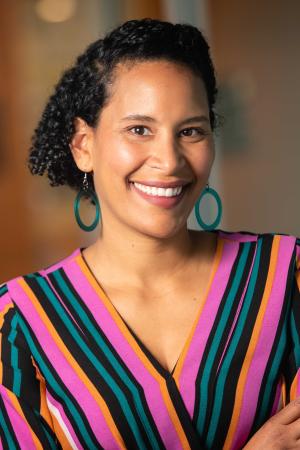People
Charisse Pickron
-
Pronouns: she, her, hers
-
Assistant Professor
Dr. Pickron's work focuses on socio-cognitive development focusing on infants' perception and representation of social groups along gender and race. She uses measures including behavioral, electrophysiological, and eye-tracking.
BA Mount Holyoke College 2008 Psychology major
MS University of Massachusetts Amherst 2015
PhD University of Massachusetts Amherst 2018 Developmental Psychology
Cognitive development; Developmental neuroscience; Early childhood; Infancy; Perceptual and motor development; Social and emotional development
Research
How do infants and young children perceive and represent the world around them? What developmental, social, and cognitive factors influence their perceptions & representations? These and other questions are key to my interest in the intersection of perceptual and socio-cognitive development. I investigate the way people and groups of people are perceived, categorized, and engaged with. What are potential social and cognitive consequences of learning to live within, perceive, and think about people as members of different groups or kinds? To address this and other related questions, I am particularly interested in better understanding the way early experiences shape infants’ and children’s processing of faces of differing social categories, such as gender and race.
I study topics of perceptual and socio-cognitive development using a variety of measures including behavioral, electrophysiological, and eye-tracking. I envision a research team of undergraduate & graduate students as well as staff all committed to engaging with and learning from one another as well as with our larger community. My burgeoning program of research will be shaped by many minds. Not just my own ideas, but the interests of students & staff, collaborators, and learning the interests and needs of members from our larger Twin Cities community.
Lab
Charisse Pickron is originally from Amherst, Ma. She graduated from Mount Holyoke College with a major in Psychology and a minor in Race and Racial Identity Development in 2008. Following graduation, she worked at Walt Disney World in Orlando, FL for two years. She completed a 12 month internship at the University of Massachusetts Amherst where she further explored her interest in a career in developmental psychology. At the University of Massachusetts, Charisse completed her Masters in 2015 under the advisement of Dr. Lisa Scott and her Ph.D. in 2018 with Dr. Erik Cheries. Her work focuses on socio-cognitive development focusing on infants' perception and representation of social groups along gender and race.
Pickron, C.B., Brown, A.J., Hudac, C.M. Scott, L.S., (2024). Diverse Face Images (DFI): Validated for racial representation and eye gaze. Behavior Research Method. https://doi.org/10.3758/s13428-024-02504-2
Pickron, C. B., Stallworthy, I. C., & Cheries, E. W. Infants' individuation of human faces across race and identity. Infancy: the official journal of the International Society on Infant Studies. https://doi.org.ezp1.lib.umn.edu/10.1111/infa.12618
Pickron, C.B. & Cheries, E. W., (2019) Infants' individuation of faces by gender. Brain Sciences.
Pickron, C.B., Iyer, A, Fava, E, & Scott, L.S. (2017) Learning to Individuate: The specificity of labels differentially impacts infants attention related visual strategies and neural responses from 6 to 9 months of age. Child Development
Pickron, C.B., Fava, E, & Scott, L.S. (2016) Follow My Gaze: Face Race and Sex Influence the Development of Gaze-cued Attention in Infancy. Infancy.
Hadley, H., Pickron, C. B., & Scott, L.S. (2014). The Lasting Effects of Process-specific versus Stimulus-specific Learning During Infancy. Developmental Science.

-
Dr. Pickron is open to advising/co-advising new PhD students in fall 2026.
- cpickron@umn.edu
Celebrate and be in inspired by the knowledge infants and children have and continue to acquire while engaging with their world.